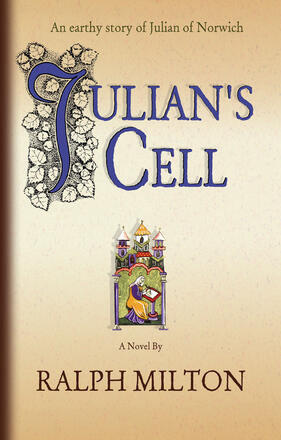
Julian's Cell
An Earthy Story of Julian of Norwich
Description
Julian’s Cell is a unique work of historical fiction, an attempt to imagine Julian of Norwich’s life as it could have been. This is the earthy story of "Katherine" – daughter of a stern and bitter mother. Married at age 16 to Walter, she loses both her children and her husband during the great plagues. She has visions of the passion of Christ and becomes an anchorite – she is "buried alive" in a cell attached to St. Julian’s church to lead a life devoted to prayer and spiritual counsel. Today she is known as Mother Julian, or Julian of Norwich, the first woman to write in the English language, and one of the greatest Christian theologians and mystics of all time.
Reviews
The story is simply told.
In many places, the narrative is both very beautiful and also quite deep – deep not in the sense of difficult, but deep like a clear pool in which you can see stones on the bottom twenty feet below.
The book in places is quite vulgar, notably in the person of Alice, Julian’s maid. But it is never blasphemous, and I must admit that I found the vulgarity added a bit of spice to the story.
Books are expensive these days, but I consider the book worth the price. It’s a good Sunday read, good for the soul.
- Alan Reynolds
Julian’s Cell, is a lovely piece of storytelling. The author firmly grounds the mystic he has grown to love in a chaotic world of enormous class difference, fruitless, bloody conflict, disease, and revolution. At the same time, Julian’s Cell conveys the richness of her solitude.
All this in a storyteller’s language, direct, clear and – in the spirit of Julian’s contemporary, Geoffrey Chaucer – sometimes bawdy. But it is always tender and compassionate. It is a generous language, entirely effective for Milton’s purpose: to help us, too, fall in love with a woman who brings the God we need to a century as troubled as her own.
- Donna Sinclair, The Observer
Milton’s story presents us with wonderfully imperfect three-dimensional characters. They struggle with God. The author also evokes, with pungent clarity, the tastes and smells of 14th century England.
There is an easy earthiness about the book (as the subtitle suggests) that lends a further element of realism and truth to the story. It is refreshing that Milton shows his characters as they came to him.
Julian’s Cell is a satisfying account, as profound as it is simple.
Milton presents an imaginative portrait of an anonymous woman whose visions are as relevant today as they were to the people of 14th century Norwich.
- Ben Wiebe, Christian Week